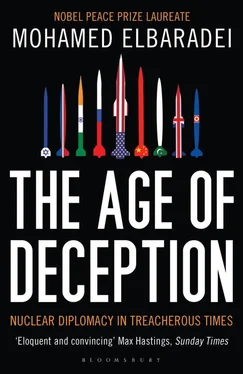With Ahmadinejad and Jalili, I again raised the notion of inviting the U.S. senators and congressmen. “It clearly would be in your interest,” I said, “to engage in rational discussions with influential Americans who can come to Tehran and hear your views firsthand.” Ahmadinejad said he would consider this proposal. I was told that they would likely come back to me with a positive answer within a couple of weeks. In fact, this never went any further.
My most significant meeting was with the Supreme Leader of the Islamic Republic of Iran. He rarely meets with non-Muslim foreign leaders. For his lofty title, Ayatollah Khamenei operates out of a very modest place, far simpler than Ahmadinejad’s offices. His working and living quarters reminded me of a very modest country house. We met in what appeared to be a living room, plain to the point of austerity. We sat on simple chairs; the other attendees were seated on a bench. As always, tea was served, with dried fruit and nuts.
I had come alone. Khamenei was accompanied by his foreign policy adviser, Ali Akbar Velayati, a former foreign minister. Aghazadeh and Saeedi were also present. I found it curious that neither Ahmadinejad nor Jalili had been invited.
In keeping with custom, we embraced in Iranian and Muslim tradition. Khamenei, tall and thin, had the look and manner of a father figure, reserved but affable and sensitive. At times I thought he almost seemed a bit frail. But he was in full command of the details and undeniably in charge.
Our meeting began with a brief public segment, which was televised. Speaking to the cameras, Khamenei declared that the Islamic Republic of Iran would never be brought to its knees—meaning, from what I could gather, that no amount of sanctions would get Iran to suspend enrichment or end what they recognized as their legitimate right.
When the camera crews had shuffled their way out, I opened the exchange. I told Khamenei I was speaking primarily as a friend of the Iranian people. I repeated the set of messages I had articulated to the other Iranian officials: the progress on Iran’s file at the IAEA, the readiness of the P-5+1 to return to negotiations, and the benefits of moving rapidly to take advantage of the current dynamic. Missteps, I said, had been taken by both sides; but we now had an opportunity to learn from the past and move forward.
Khamenei listened attentively. He thanked me for the independence I had maintained in the face of external pressure. This, in his view, had added to the Agency’s credibility. Iran was committed to work with the IAEA to resolve all remaining nuclear issues, he said. In fact, the IAEA should be Iran’s only interlocutor; it had been a mistake to discuss Iran’s nuclear program with others. Once the Security Council returned the Iranian file to the Agency, he added, Iran would be ready to implement the Additional Protocol.
But with a small motion of his hand, Khamenei dismissed suspending or freezing Iran’s enrichment operations. This, he said, was merely a distraction invented by the Americans. The real issue was U.S. anger over Iran’s emerging role in the region. Khamenei was ready to engage with the West on all issues of regional security and trade, but he saw no reason for Iran to show flexibility about enrichment. Iran, he insisted, had never had a nuclear weapons program; to do so, he told me, would be against Islam. I knew he had repeatedly made this statement publicly.
I mentioned how important I believed it was to restore relations with Egypt and Iran’s other neighbors. Khamenei nodded, replying that Iran had been ready to take this action for some time; however, he did not believe that Mubarak was “able to take such a decision.” I couldn’t tell whether he was referring to Mubarak’s lack of leadership or to the pressure Mubarak was under from the Americans and his own Egyptian intelligence chiefs. I did not pursue the topic.
As part of our visit, the Iranians offered to take us to visit their R&D laboratory, where they were working on their “next-generation” centrifuges: a modified version of the P-2 machine, which would be much more efficient than the P-1 model in use at Natanz. A number of prototypes were in development, which they planned to test in the pilot enrichment facility at Natanz. The laboratory itself presented a striking image. It resembled any Western lab: clean, organized, and filled with young scientists and engineers working on various instruments and computers. The conspicuous difference was the young women in traditional chadors, skilled in advanced software and ultramodern design techniques, hard at work enhancing Iran’s uranium enrichment capability.
Aghazadeh, who accompanied our group, mentioned proudly that most of the material and equipment in use was now being indigenously produced in Iran. For both Olli and me, the implications of this were immediately apparent: tracking Iran’s enrichment activities would be more difficult, since there would be less import-export activity and procurement reporting. In Olli’s view, the shift to indigenous production also implied that Iran had no plans to go to industrial-scale operation at Natanz for a couple of years. It would make little sense to use up their limited supply of certain materials—for example, maraging steel—just as they were about to embark on developing a more efficient model.
I gave no media interviews during my time in Tehran. I knew the Iranian press would spin whatever I said. I issued a short press statement upon my return to Vienna, saying we had agreed to accelerate the process of cooperation.
Back in Vienna, I was flooded with phone calls. David Miliband rang on my first day back. Steinmeier and Kislyak came to see me. I gave each of them—and all the other members of the P-5+1—a detailed briefing emphasizing the likely negative impacts of pushing for a third Security Council resolution with additional sanctions. The provocation of another resolution could well induce Iran to cut its cooperation with the Agency, just as we were poised, under the work plan, to discuss the details of the alleged past weaponization studies and the potential involvement of the Iranian military in the nuclear program. I also mentioned what I’d heard about the likely impact of such a resolution on the outcome of the Majlis elections in mid-March.
Steinmeier was not optimistic that the six countries would agree on any other way forward. “The U.S. has not understood this region for the past thirty years,” he said. “If the council decides to go for a third resolution,” I urged him, “at least try to make it somewhat encouraging to Iran.” Instead of more sanctions, why not give Iran credit for its recent cooperation with the IAEA? “And please,” I pressed, “try to allow us time to complete the work plan.” We were somewhat behind the original schedule but still making steady progress, and now was not the moment to take action that might induce Iran to withdraw cooperation.
The P-5+1 met in Berlin on January 22. To my considerable disappointment, Steinmeier made a public statement that the six countries had agreed on the content of a new Security Council resolution to be considered in New York “in the coming days and weeks.” To me, he had promised that no resolution would be adopted before the end of February.
In the midst of the chatter about a new resolution, support for dialogue with Iran came from a surprising quarter: in an interview on CNN, Colin Powell said, “We’re talking to them in Baghdad every few months about security matters. And if we can do that in Baghdad with our ambassador and their representatives, I don’t see why we can’t speak to them in other fora.” It was the first time I had heard Powell—now out of office—taking a swipe at the Bush administration’s policy on Iran:
Читать дальше












